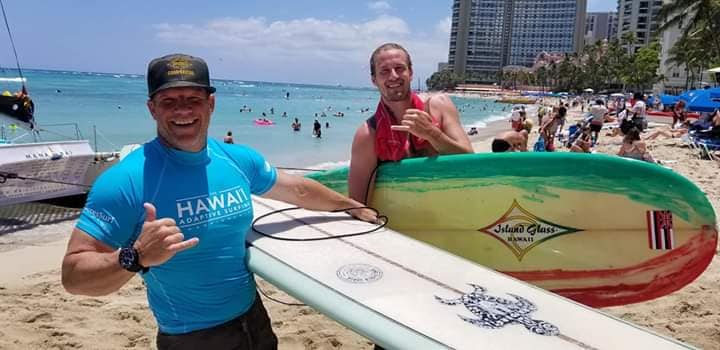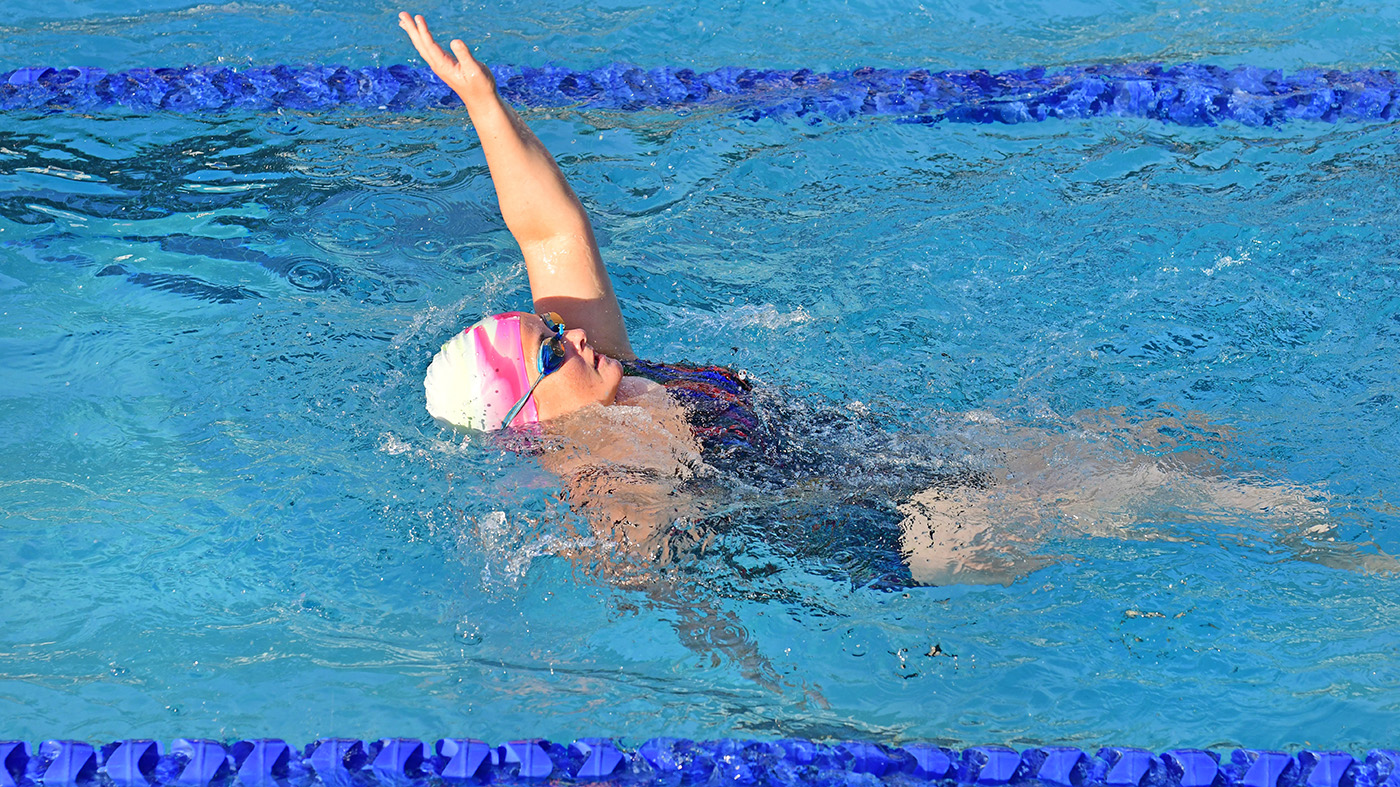
Dana Cummings lost his prosthetic leg while surfing a couple weeks ago in San Diego, but that won’t stop him and AmpSurf from coming to this year’s National Veterans Summer Sports Clinic.
Missing: One leg
Description: Orange, red and black with tire tread and pictures of palm trees, surfers and marching soldiers. If found, please return to Dana Cummings, no questions asked.
Cummings, a Marine Corps Veteran, is bummed about the missing leg, but said it’s par for the course for adaptive surfing with one leg in San Diego.
“No, it’s still MIA,” he said. “Still out there floating somewhere. I built another one out of some parts I have and still have to glue the tread on. I lost one in Morro Bay 10 years ago. Three weeks later it washed up two miles down the beach. Maybe someone in Tijuana will find this leg.”
That won’t stop him from bringing his organization, AmpSurf, to the National Veterans Summer Sports Clinic, Sept. 15 to 20, in San Diego. More than 150 Veterans with various disabilities from across the U.S. will travel to California for a week of adaptive adventure sports and lessons in sailing, surfing, kayaking, pickle ball and cycling.
Cummings and AmpSurf will take many of those Veterans out for the first time in their lives on the water and teach them how to catch a wave.
“This is the thing. Not trying to make world-class surfers out of these guys and women. Not trying to make them adaptive surf champs. We just want to focus on their abilities. We don’t focus on what you can’t do. To get that rush of riding the wave, the sensation of feeling that wave, it helps these Veterans get more active.
“Everybody else out there may focus on the disability. When I walk down the street, people can’t help but stare at the leg. But through surfing, we are focusing on their abilities. I don’t care if you don’t surf again after that, but hopefully people go home and realize they surfed for this one week, they can do anything.”
Cummings never surfed when he had two legs. He served in the Marine Corps from 1989 to 1995, including a tour in Desert Storm. While driving his family in a Volkswagen bus in 2002, a vehicle in front of him slammed on the brakes to make a U-turn. Cummings whipped his vehicle to the side and took the brunt of the impact, crushing his legs.
“I remember the first prosthetist asked me, ‘What do you want to do?’ And I told him I wanted to surf. And he said, ‘That’s probably not going to happen. You have to be realistic.’
“And I was like, ‘F you!’
“I was extremely suicidal. But being out in the water, I didn’t have that fear. It helped me focus. The first time I was catching that wave … I was on top of the world.”
— Navy Veteran Jamil-Ann Linton
“I got on my laptop, found another guy who told me he’d help me make it happen. I was surfing a week after I got out of the hospital. Those first two waves I caught l was laying down, but just happy to be there. The next time, I was able to stand up for two seconds.
“Now I can ride a long board forever. If I can do this, a fat, little farm guy from Maine, anybody can do this.”
Cummings discovered something else in the surf, too. It was like magic pill for his post-traumatic stress and other issues from the war.
“Surfing is my therapy,” he said. “I used to be on all these medications for depression, anxiety and PTSD. I don’t take any of them anymore. I surf. I surf almost every day. And I can tell, when things are going haywire, I have to go get in that water. And thank God VA realizes surfing is therapy. It’s natural.
“Mentally, physically, spiritually, it does all that.”
Since that day he took his first surfboard out, Cummings went on to start his organization that now has chapters in California, New York and New England, with another one starting in Oregon.
“We’ll take anyone out — Veterans, blind, kids, anyone with disabilities. It’s funny, I kind of chuckle at how far we’ve grown. I just got back from Oregon and was washing out these wet suits and I never imagined this.”
Changing minds, saving lives

Dana Cummings said his organization has taught Veterans, children and others with disabilities to surf, such as Rumi Walsh — the daughter of a Veteran — who lost one of her arms.
After one event, he sent a survey to participants. A Navy Veteran wrote back and said she was thinking of killing herself only days earlier, but AmpSurf changed her mind.
Jamil-Anne Linton said she was in such a deep depression with PTSD that she saw no way out.
“I was extremely suicidal,” she said. “But being out in the water, I didn’t have that fear. It helped me focus. The first time I was catching that wave, I got this feeling of humility, but also a feeling like I was on top of the world. And I love that feeling.”
Now she’s paying it forward. She went back to school to become a registered nurse and is working with mental health patients. She also continues to surf every week with Cummings and spread the word about his program.
“On a day I’m extremely stressed,” she said, “I go out on the water.”
“I can do it again”
AmpSurf made the difference, too, for Army Veteran Jason Wheeler. He was injured while parachuting out of a Blackhawk helicopter during a training exercise, eventually losing both legs above the knee. The collision with the ground caused sight damage and he’s also legally blind.
“I had never even surfed before then,” Wheeler said. “But you get this energy from the water. You get that one solid wave. You know, you have good days and bad days, and you don’t know what it’s going to be. Surfing is just a like a day. When you wipe out, you say, ‘I can do it again.’
“It gives us a way of focusing on the abilities we can do. When you think about the negativity, it’s going to drown you, and that’s why we have so many suicides. Or you can surf and become whole. We’re all whole, we’re just like Rubik’s Cubes, just broken apart. Some of us just need to be put back together to become beautiful art.”
For more information on AmpSurf visit their website or Facebook page.
Topics in this story
More Stories
Nearly 400 Veterans from across the country have gathered in Snowmass Village for the 39th Annual National Disabled Veterans Winter Sports Clinic. This premier adaptive rehabilitation event, co-presented by VA and Disabled American Veterans (DAV), continues through April 5.
Older than the PGA, 108-year-old Veteran Donald Johnson is still getting out on the golf course with the National Disabled Veterans Golf Clinic.
West Virginia mom builds confidence at the National Veterans Wheelchair Games.






